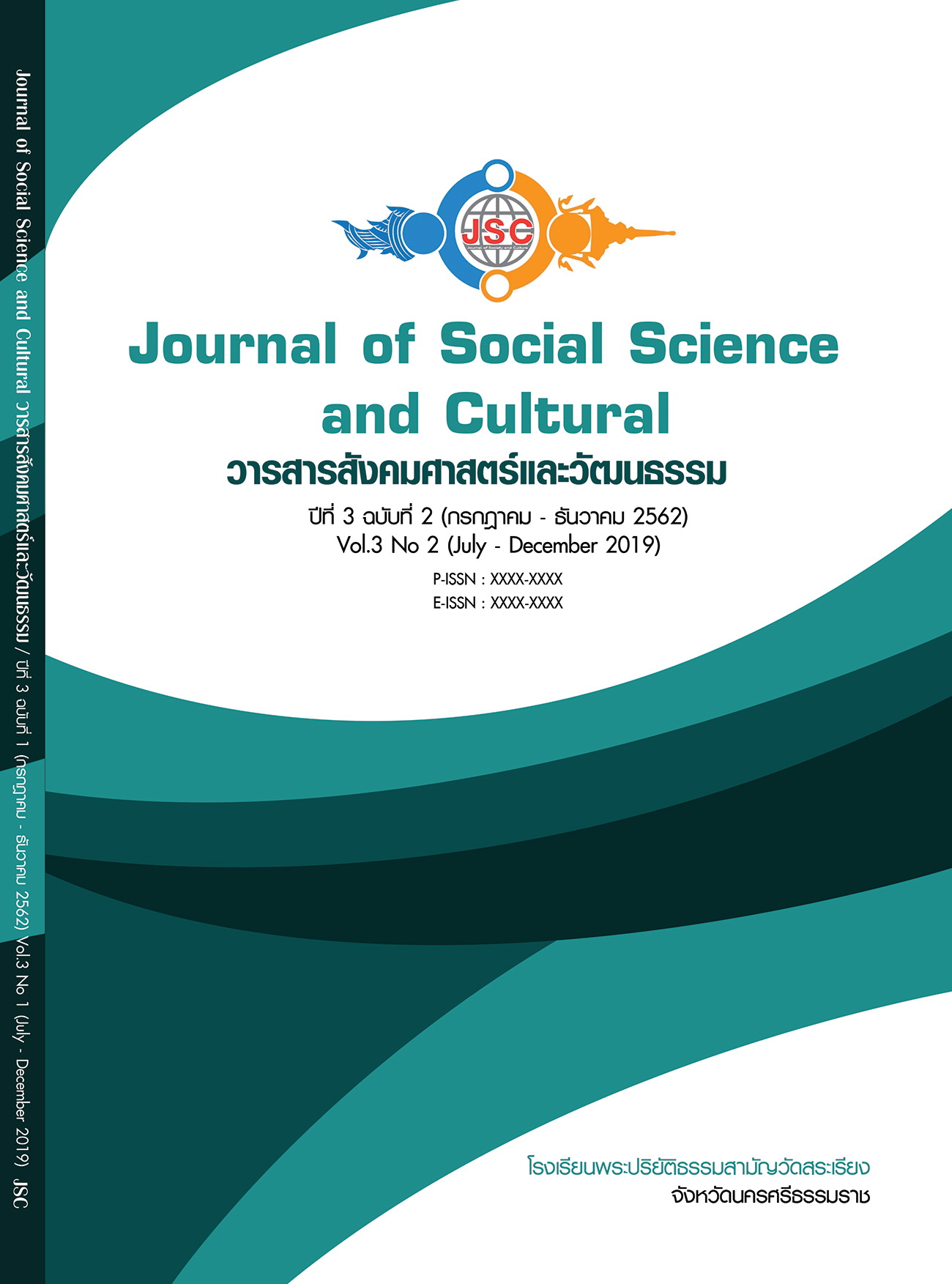AN ANALYTICAL STUDY OF THE BENEFIT OF RIGHT SPEECH SAMMAWACA IN FAMILY INSTITUTION OF KANLAYANEESITHAMMARAT SCHOOL’S STUDENTS IN NAKHON SI THAMMARAT PROVINCE
Main Article Content
Abstract
The purposes of this research were: 1) study the concept of right speech in Theravada Buddhist scriptures, 2) study the benefit of right speech in Theravada Buddhist scriptures, and 3) analyze the benefit of right speech in the family institution. The study was quantitative research method by the document and in-depth interviews. Select purposive sampling group to represent people with School student representative Kalyanee Sithamrat, in Nakhon Si Thammarat. It is divided into 3 groups such as: 1) teacher, 2) ruler, and 3) student total of 15 persons. All of which is a knowledge of right speech, award-winning for its good deeds over 5 times more. By analyzing the content and summarizing. The research was found that: 1) concept of right speech, right speech is speaking the truth. Speaking melodic arpeggios Speaking at the correct time, say, fair to say, then do not put yourself and others suffered. There are 3 reasons: 1.1) Katha sammavaca, 1.2) Cetanasammavaca, and 1.3) Viratisammavaca. 2) benefits of speech in scripture Buddhism has four aspects: 2.1) society of the faithful abstain from false speech. And speak the truth, 2.2) social harmony. Deliberately refrained from speaking sneaky, 2.3) Society of kindness. Using verbal euphemistic politeness, respect each other, and 2.4) a society of sacrifice. Useful words and Lange. and 3) benefits of the right speech to the Family Institute is realize the importance of right speech promotes peaceful and peaceful society and can build faith in the parents. Family institute or administrators at all levels, all organizations, right speech is a guideline for the creation of peace for people in the country and the world society sustainably.
Article Details
References
กลุ่มครูผู้สอน. (15 ตุลาคม 2563). การศึกษาวิเคราะห์ประโยชน์ของสัมมาวาจาในสถาบันครอบครัวของนักเรียนโรงเรียนกัลยาณีศรีธรรมราช จังหวัดนครศรีธรรมราช. (พระอนุรักษ์ อนุรกฺขิโต (รัฐธรรม), ผู้สัมภาษณ์)
กลุ่มนักเรียน. (15 ตุลาคม 2563). การศึกษาวิเคราะห์ประโยชน์ของสัมมาวาจาในสถาบันครอบครัวของนักเรียนโรงเรียนกัลยาณีศรีธรรมราช จังหวัดนครศรีธรรมราช. (พระอนุรักษ์ อนุรกฺขิโต (รัฐธรรม), ผู้สัมภาษณ์)
กัลยรัตน์ คำคูณเมือง. (2560). พุทธวิธีการใช้หลักสัมมาวาจาในการสร้างคุณธรรมเพื่อธุรกิจขายตรง. ใน วิทยานิพนธ์พุทธศาสตรมหาบัณฑิต สาขาวิชาธรรมนิเทศ. มหาวิทยาลัยมหาจุฬาลงกรณราชวิทยาลัย.
เจนจิราภรณ์ นามโคตร. (2562). บทบาทหน้าที่ของสถาบันครอบครัว. เรียกใช้เมื่อ 19 สิงหาคม 2562 จาก https://sites.google.com/site/ann5481136701/bth-thi4chiwit-laea-khrxbkhraw-suksa/4-1bthbath-hnathi-khxng-sthaban-khrxbkhraw
ชญาชล คลังกรณ์. (2559). ศึกษาวิเคราะห์หลักสัมมาวาจาเพื่อการประนีประนอม: กรณีศึกษา ผู้ประนีประนอมประจำศาลจังหวัดอุตรดิตถ์. วารสารสันติศึกษาปริทรรศน์ มจร, 4(ฉบับพิเศษ), 220-233.
บุญชม ศรีสะอาด. (2556). วิธีการทางสถิติสำหรับการวิจัย เล่ม 2. กรุงเทพมหานคร: สุวีริยาการพิมพ์.
พระปลัดวุฒิพงษ์ กิตติวฺณโณ (ผลไม้). (2557). วิเคราะห์สัมมาวาจาในคัมภีร์พระพุทธ ศาสนา. ใน ดุษฎีพุทธศาสตรดุษฎี สาขาวิชาสันติศึกษา . มหาวิทยาลัยมหาจุฬาลงกรณราชวิทยาลัย.
พระปลัดสมชาย ปโยโค (ดำเนิน). (2556). การประยุกต์ใช้สัมมาวาจาเพื่อการบริหารงานของผู้นำ. วารสารสันติศึกษาปริทรรศน์, 1(1), 143-158.
พระพรหมคุณาภรณ์ (ป.อ. ปยุตฺโต). (2549). พุทธธรรม ฉบับปรับปรุงและขยายความ. (พิมพ์ครั้งที่ 11). กรุงเทพมหานคร: สหธรรมิก.
พระมหาสุรวุฒิ จนฺทธมฺโม (แสงมะโน). (2557). การศึกษาเรื่องสัมมาวาจาในพระพุทธปรัชญาเถรวาท. ใน วิทยานิพนธ์พุทธศาสตรมหาบัณฑิต สาขาวิชาพระพุทธศาสนา. มหาวิทยาลัยมหาจุฬาลงกรณราชวิทยาลัย.
มหาจุฬาลงกรณราชวิทยาลัย. (2539). พระไตรปิฎกภาษาไทย. กรุงเทพมหานคร: โรงพิมพ์มหาจุฬาลงกรณราชวิทยาลัย.
Cronbach, L. J. (1990). Essentials of psychological testing (5th ed.). New York: Harper Collins Publishers


